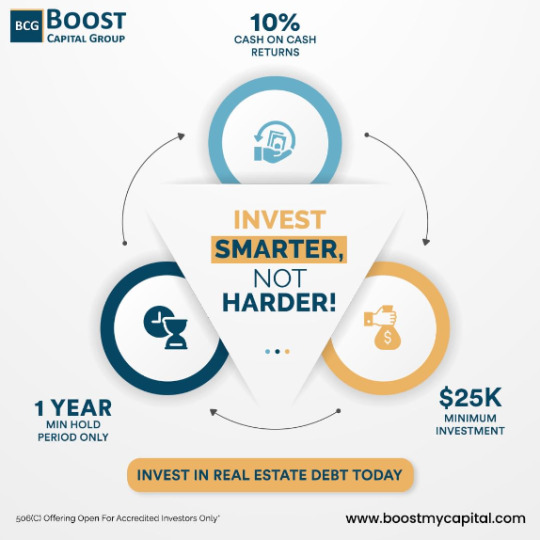#debtfunds
Text
Maximize Your Returns with Debt Funds from ReRx Funds
Looking for a stable and lucrative investment opportunity? Dive into the world of debt funds with ReRx Funds! Our debt funds offer a strategic way to invest in real estate debt, providing a balanced mix of risk and return. Perfect for investors seeking regular income, our funds focus on mortgage notes investing and real estate debt to deliver assured returns.
At ReRx Funds, we understand the importance of diversification. That's why our debt funds are designed to be recession-proof, offering a safe harbor in uncertain times. With options for self-directed 401k and IRA real estate investing, you can tailor your retirement portfolio to include these robust debt investments.
Our experienced team is dedicated to sourcing the best alternative investments, ensuring that your capital is not only protected but also poised for growth. Whether you're new to investing in real estate notes or looking to expand your existing portfolio, ReRx Funds is here to guide you towards financial success.
Ready to explore the potential of debt funds? Visit us to learn more and start your journey to secure, profitable investing today!
#DebtFunds#RealEstateInvesting#MortgageNotes#RecessionProof#AlternativeInvestments#RetirementPlanning#ReRxFunds
0 notes
Text
Introduction to Mutual Funds: A Beginner's Guide

Investing your money wisely is a key step towards achieving your financial goals. However, the world of finance can often be complex and intimidating, especially for beginners. One avenue that offers a relatively simple and diversified approach to investing is mutual funds. In this beginner's guide, we'll break down the basics of mutual funds, helping you understand what they are, how they work, and why they might be a suitable option for you.
What is a Mutual Fund?
A mutual fund is a collective investment vehicle that pools money from multiple investors to invest in a diversified portfolio of securities, such as stocks, bonds, or other assets. The fund is managed by professional fund managers who make investment decisions on behalf of the investors.
How Do Mutual Funds Work?
When you invest in a mutual fund, you're essentially buying units or shares of the fund. The value of these units is determined by the fund's Net Asset Value (NAV), which is the total value of the fund's assets minus its liabilities. NAV is calculated daily at the end of the trading day.
Mutual funds offer various investment options, each with its own investment objective. These objectives can range from capital appreciation (growth funds) to regular income generation (income funds) to a blend of both (balanced funds).
Advantages of Mutual Funds:
Diversification: Mutual funds allow you to invest in a broad range of securities, reducing the risk associated with putting all your money into a single investment.
Professional Management: Experienced fund managers manage mutual funds, making investment decisions based on their expertise and research.
Accessibility: With a relatively low initial investment, mutual funds make investing accessible to a wide range of individuals.
Liquidity: Most mutual funds offer easy redemption options, allowing you to sell your units and access your money when needed.
Flexibility: Mutual funds come in various types, catering to different risk appetites and financial goals.
Types of Mutual Funds:
Equity Funds: These invest primarily in stocks, offering the potential for high returns but also carrying higher risk.
Debt Funds: Debt funds invest in fixed-income securities like bonds and government securities, focusing on generating regular income.
Balanced Funds: These strike a balance between equity and debt investments, aiming for both capital appreciation and income generation.
Index Funds: These aim to replicate the performance of a specific market index, providing diversified exposure to the entire market.
Sectoral Funds: Sector funds invest in a specific sector or industry, allowing you to focus on areas you believe will perform well.
Money Market Funds: These invest in short-term money market instruments, providing liquidity and stability.
Getting Started:
Set Clear Goals: Define your financial goals, whether it's saving for a vacation, buying a home, or planning for retirement.
Assess Risk Tolerance: Understand your risk appetite to choose the right type of mutual fund that aligns with your comfort level.
Research: Study different mutual fund options, considering factors like historical performance, expense ratios, and fund manager expertise.
Start Small: Begin with a small investment, and consider using Systematic Investment Plans (SIPs) to invest regularly.
Monitor and Review: Keep track of your investments and review your portfolio periodically to ensure it remains aligned with your goals.
In conclusion, mutual funds provide an accessible and diversified way for beginners to start investing in the financial markets. By understanding the basics, assessing your goals, and conducting proper research, you can make informed investment decisions that align with your financial aspirations. Remember that investing always carries risks, and seeking advice from financial experts can be beneficial as you embark on your investment journey.
You just have TO manage your savings & invest TO grow your money!

#MutualFunds#MutualFundsSahiHai#SIP#PersonalFinance#FinancialPlanning#FinancialFreedom#EquityFunds#DebtFunds#IndexFunds#RetirementPlanning#PassiveInvesting#StockMarket#StockMarketindia#stocks#stock market crash
0 notes
Text

Why should you invest in ULIP? Get started today by requesting a free quote and consultation with me! Send me a message or Call today If you have Question Ask us : 0120-2790491, 0120-2790490
#PrahimInvestments#ulip#insurance#insuranceagent#insuranceplan#insuranceplans#insuranceplanning#investment#investments#investmenttips#investmentbanking#equity#equitymarket#debtfunds#lifecover#taxbenefits#SavingsGoals#lifeinsurance#lifeinsuranceagent
1 note
·
View note
Photo

Take control of your investments with a clear understanding of the different types of mutual funds and the risks involved. Learn about Equity Funds, Debt Funds, Hybrid Funds, and more to find the best fit for your financial goals and risk tolerance. #MutualFunds #EquityFunds #DebtFunds #InvestmentAdvice #FinancialPlanning https://www.instagram.com/p/CqdQh02PPrg/?igshid=NGJjMDIxMWI=
0 notes
Link
#AdaniGroupstocks#CreditSuisse#crudeoilprices#debtfunds#derivativesexpiry#DeutscheBank#dividendpayments#domesticequities#Europe'sbanks#financialservicesindustry#foreigninstitutionalinvestors#FPIflows#futuresandoptions#globalmarkets#goldprices#marketoutlook#Nifty50#NSE#securitiestransactiontax#technicalindicators#UBS
0 notes
Text
Equity Nivesh is started by me to share my learning in stock market & help beginners to create wealth for short or long term. You can choose to invest in mutual funds or start trading in stocks with your spare money & earn handsome return. I am not an expert in stock market but will definitely help others to grow with me & guide you in the right direction.
Note: Trading in the stock market is subject to market risks, please consult your advisor or do your homework before taking a position for short or medium term.
Disclaimer - The content is purely for educational purpose and advice or recommendation available on the site are taken from the brokerage report.
My Top 3 Trading & Investing App 👈
ZERODHA 🥇
GROWW 🥈
INDMONEY 🥉
Special Offer: Subscribe & get upto Rs. 1500 off on ET Prime Annual Membership.
#Stocks#StockMarket#StockMarketIndia#StockMarketCrash#ShareMarket#MutualFunds#MutualFundsSahiHai#EquityFunds#DebtFunds#HybridFunds
0 notes
Text
Debt Mutual Funds - How to Invest and Who Should Invest

Debt mutual fund is mutual funds that invest in fixed-income securities such as commercial paper (CP), certificates of deposit (CD), corporate bonds, short-term government securities, government securities, and other money market instruments. These instruments have a fixed maturity date and a fixed interest rate that the buyer earns until the security matures. Considered to be less volatile than equity funds, they are ideal for investors who are relatively risk-averse and seek investment stability. In this article, we will learn about debt mutual funds, debt funds, and who should invest in debt mutual funds.
0 notes
Text

Ultra Short Duration Funds are debt funds that lend to companies for a period of 3 to 6 months. These are low-risk funds owing to their low lending duration. The risk is slightly higher than liquid funds.
Contact us for more info: 9910133556
#HybridFunds#debtfunds#equityfunds#MonthlyIncome#investingforbeginners#investingtips#investors#investorswanted#investorlife#investment#investmentopportunity#investmentchallenge#investor#investing#investing101#equitymarkets#stockmarket#USstocks#FixedDeposit#fixedincome#mutualfunds#MutualFundsInvestment#MutualFundsSahiHai#MutualFundInvesting#taxsavings#retirementplanning#sip#moneymindset#entrepreneur#business
1 note
·
View note
Photo

Balanced Hybrid / Aggressive Hybrid
This fund will invest 40-60% of its total assets in debt and equity instruments. A balanced fund has the advantage of providing comparable equity returns while being less risky.
Aggressive hybrid funds combine investments in two asset classes: equity and debt. According to the rules, these funds must invest at least 20% of their assets in debt instruments. Only 80% of assets can be allocated to equity and equity-related instruments.
#finance#rrfinance#balancedhybrid#aggressivehybrid#taxsaving#liquidfunds#equityfunds#hybridfunds#debtfunds#plan#sip#investor#education#mutualfunds#fundscapital#rrgroup#insurance#capital#investment
0 notes
Text

As we begin the year 2024, Terkar Capital extends heartfelt wishes for financial success, stability, and growth. Let’s explore the opportunities together.
0 notes
Text
Assured Returns in Real Estate: A Smart Investment Move
Seeking guaranteed returns? Explore ReRx Funds for your real estate investment needs, where certainty meets opportunity. With a focus on real estate debt, experience stable outcomes and decreased market volatility. Take the smart investment move today by earning assured returns with ReRx Funds.
Learn more about our offerings and begin investing confidently now!
0 notes
Text

Are you looking to achieve financial freedom? Real estate investing might be the key. ✨
👉Grow your wealth - schedule a call with our team today.
https://bit.ly/3ANEIh4
With the Boost Wealth Fund, you can customize your real estate portfolio and grow your wealth while securing your financial future. .💸
Our short-term debt opportunity offers a minimum investment of $25k with a one-year hold period and a competitive 10% cash-on-cash return. Invest smarter, not harder.😎
Don't let your financial goals slip away, invest in real estate today with the Boost Wealth Fund.🙌
[506(C) Offering Open For Accredited Investors Only]
#boostmycapital#passiveincome#passiveincomestream#passiveincomeinvesting#passivesideincome#passiveincomestreams#investments#investmentstrategies#realestateinvestments#investmentstrategy#propertyinvestments#alternativeinvestments#smartinvestments#investmentspecialist#multifamilyinvestments#diversification#shorttermdebtfund#debtfund
1 note
·
View note
Text

Why should you invest in ULIP? Get started today by requesting a free quote and consultation with me! Send me a message or Call today If you have Question Ask us : 0120-2790491, 0120-2790490
#PrahimInvestments#ulip#insurance#insuranceagent#insuranceplan#insuranceplans#insuranceplanning#investment#investments#investmenttips#investmentbanking#equity#equitymarket#debtfunds#lifecover#taxbenefits#SavingsGoals#lifeinsurance#lifeinsuranceagent
0 notes
Photo

Take control of your investments with a clear understanding of the different types of mutual funds and the risks involved. Learn about Equity Funds, Debt Funds, Hybrid Funds, and more to find the best fit for your financial goals and risk tolerance. #MutualFunds #EquityFunds #DebtFunds #InvestmentAdvice #FinancialPlanning https://www.instagram.com/p/CqdO6SNyZTR/?igshid=NGJjMDIxMWI=
0 notes
Text
Debt funds are the pool of investments that are invested in highly rated fixed-income earning securities like central and state government bonds, treasury bills, and other money market instruments. It is to be noted that debt funds are investing into fixed income earning instruments and hence the risk is quite less.
0 notes